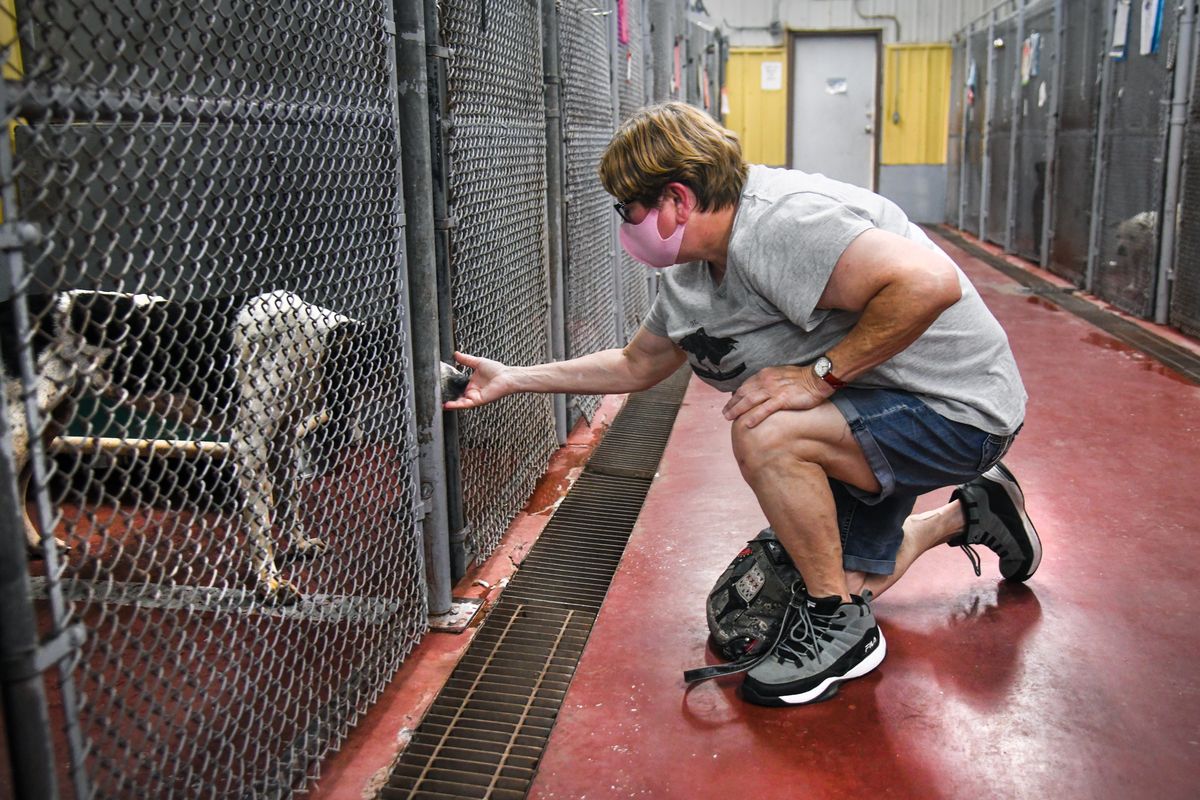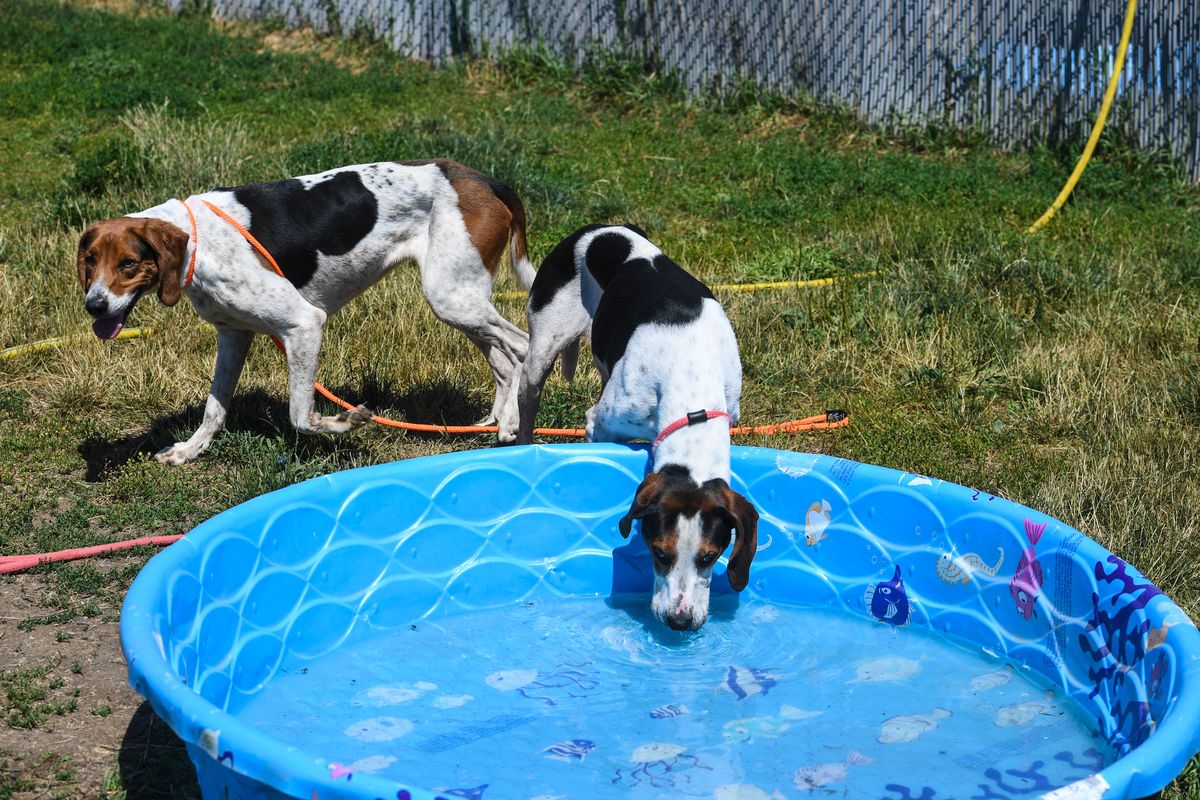Open hearts (and the ‘boredom of quarantine’) mean empty kennels at Spokane animal shelters

For most Spokane establishments, empty spaces where there were once guests, friends and customers is a depressing sight – a sad reminder that things aren’t like they used to be, and won’t be for a while.
For animal shelters, it’s a cause for celebration, and one of the few good side effects of the pandemic.
The Spokane Humane Society reopened its doors for walk-in adoptions a week ago, and already 69 dogs and cats have been scooped up. While the shelter was closed, only 38 animals were heading out the door each week.
Director Edward Boks said that was partially to do with a backlog. The shelter closed to the public in March, and adoption visits were by appointment only, so people weren’t able to take a new pet home as easily until now.
“But I think part is that a pet in the home really helps alleviate some of that loneliness and boredom of quarantine,” Boks said. “Animals really are the perfect antidote.”
With so many Spokane-area residents trapped at home during pandemic shutdowns, local shelters have seen an increase in adoptions and fostering.
At SpokAnimal’s shelter in east Spokane, all the resident dogs were moved to foster homes when the shelter shut down in March, according to director Dori Peck. Originally, the plan was just to ensure the pups had comfortable homes with plenty of attention until the shelter could get back up and running.

But by the time they were ready to bring the dogs back to the shelter, all 43 of them had become a permanent part of their foster families, Peck said.
“It really was a very happy unintended consequence of shutting down,” Peck said.
Throughout the pandemic, Peck said SpokAnimal has averaged 65 cat adoptions every week through its partner adoption facilities in PetSmart and Petco locations around Spokane, plus the newly opened Kitty Cantina. That’s part of a trend over the last three years or so, Peck said, with cats becoming more popular among those who live in apartments or move frequently.
But once all the shelter’s cats were moved offsite to the partner locations after the shutdown, Peck said the rate of adoptions increased even more. What started as a temporary move for convenience worked so well that Peck said SpokAnimal will no longer operate its cat room at the shelter. Instead, all adoptable kitties will go straight to the partner facilities to find their forever homes faster.
Even in the midst of summer – typically known as “kitten season” among shelter workers – SpokAnimal simply can’t keep up with the demand, Peck said.
At the Humane Society shelter, potential adoptees formed a line 50 people deep on the first day the shelter reopened, some waiting more than two hours to meet a new furry friend, Boks said. On an average Wednesday, the shelter would usually see four or five adoptions. On that Wednesday, over 20 pets went home with new families.
Despite the recent demand, Boks said the shelter has seen steady intake numbers similar to those before the pandemic. Lindsey Soffes, director of the Spokane County Regional Animal Protection Service, or SCRAPS, said her shelter is also still regularly taking in pets, though she’s seen a lot more interest from local residents who want to foster pets while the shelter is appointment-only.
“That’s probably because people are alone at home and want a way to help without going out,” Soffes said. “Which is good, because all our pets could use a chance to get out of the shelter even just for a night or two.”
The Humane Society and SpokAnimal both reduced or entirely cut their volunteer programs during the shutdown to maintain social distancing, though Boks said a dedicated group of dog walkers still came every day to make sure each resident got time to play outside. Now that the shelter is returning to some form of normality, Boks said volunteers are needed more than ever for everything from pet care to web design and groundskeeping.
“I think if you’re tired of doing your own yard work in quarantine and you want a way to help, it would be great to have community members help us take care of our campus here,” Boks said.
But like many nonprofit organizations, shelters have struggled to bridge the gap in funding. While adoption fees and donations have remained fairly steady, Boks said the shelter’s biggest fundraiser events of the year have had to be canceled or postponed. Right around this time in the summer, they’d usually be putting on the Parade of Paws pledge walk, with dozens of pups and their people overtaking the streets near the shelter.
That won’t be feasible this year, so instead the shelter will put on a drive-in showing of the movie “The Secret Life of Pets” and its sequel using a four-story screen on its campus. The event, called Flicks for Fido, is expected to draw up to 200 cars, Boks said, helping fill some of the gaps in funds.
Hopefully, Boks said, the Parade of Paws can be rescheduled for Oct. 4, the feast day of St. Francis of Assisi, the patron saint of animals. Walking up the hill from the shelter to the Catholic church at Mount St. Michael, Boks hopes participants will be able to have their pups blessed by a priest, a tradition for the parade.
“Each day our process for helping animals find homes while keeping everyone safe gets a little better defined,” Boks said. “Maybe soon, we’ll stumble into the new normal for us.”